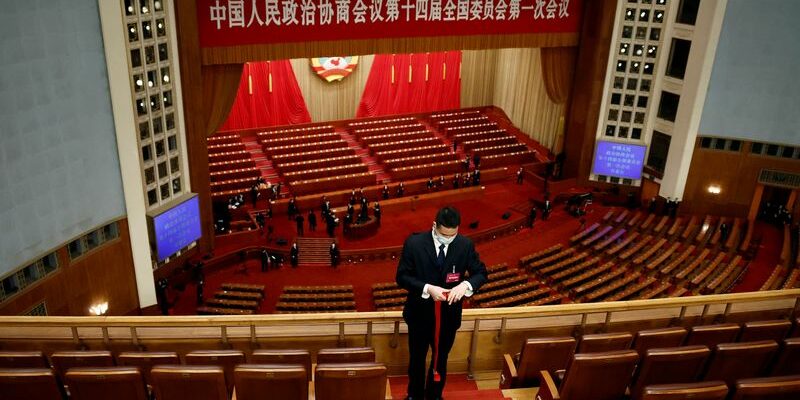by Liz Lee and Ryan Woo
BEIJING (Reuters) – China’s legislature will vote in the coming days on a plan to reform the institutions of the State Council, which serves as the central government, and decide on a new composition for the next five years, according to an agenda set on Saturday.
The National People’s Congress (NPC), which meets every year, will also consider a range of reports, including on the work of the current prime minister’s government, parliament spokesman Wang Chao said during a briefing. a press conference.
Draft amendments to the country’s legislative act – which governs how laws are made – are also on the agenda of the meeting due to start on Sunday.
During the second half of the NPC session, which runs until March 13, the nearly 3,000 members of this parliament, whose work is largely rubber stamped, will elect and approve a new set of senior government officials.
Xi Jinping is expected to secure his third five-year term as president when lawmakers vote on March 10.
He renewed his calls this week for an “intensive” reorganization of state entities and the Communist Party, adding that part of the reform plan concerning state institutions would be presented to parliament.
Lawmakers are also due to vote on the Council of State’s institutional reform plan on March 10.
The call for institutional reforms comes after China’s economy grew by 3% last year – one of its weakest rates in nearly half a century – weakened by the strict measures fight against COVID-19 championed by Xi Jinping and lifted in December.
On Sunday, a government work report, due to be presented by Premier Li Keqiang at the opening of parliament, will unveil the official 2023 economic growth target, among many other social and economic goals.
The GDP growth target could reach 6%, down from a range of 4.5% to 5.5% proposed in November, sources told Reuters this week.
Parliament will decide on March 11 on the new Prime Minister for the next five years. A day later, he will vote on a new set of deputy prime ministers, state councilors and ministers, as well as the governor of the People’s Bank of China.
(Report by Liz Lee and Ryan Woo, French version Benjamin Mallet)
©2023 Thomson Reuters, all rights reserved. Reuters content is the intellectual property of Thomson Reuters or its third party content providers. Any copying, republication or redistribution of Reuters content, including by framing or similar means, is expressly prohibited without the prior written consent of Thomson Reuters. Thomson Reuters shall not be liable for any errors or delays in content, or for any actions taken in reliance thereon. “Reuters” and the Reuters Logo are trademarks of Thomson Reuters and its affiliated companies.
